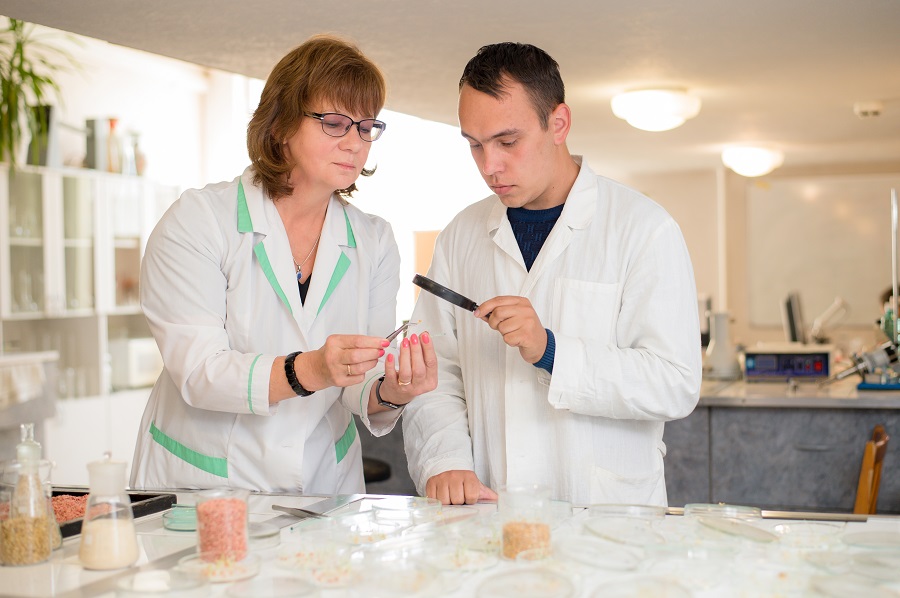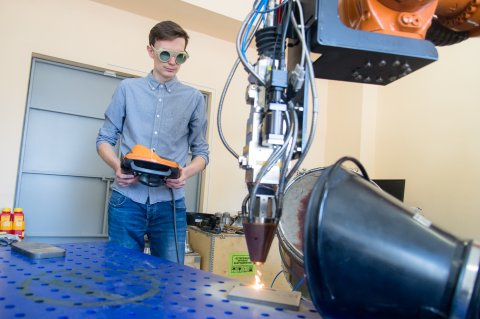Every year, February 8th, the scientific community of the Russian Federation celebrates its professional holiday, approved by the decree of the President of the Russian Federation: the Russian Science Day. Being one of the flagships of the development of science in Russia, South Ural State University fulfils the development strategy within the framework of digital industry, materials science and ecology, what meets the global research trends.
“We simply have to be the first in Russia in the field of digital industry,” says Aleksandr Shestakov, SUSU Rector. “We are actively collaborating with the world masterminds in this field: Emerson, SMS group, Siemens and more. We are also collaborating with the major industrial partners working on the global market. First and foremost, this is Magnitogorsk Iron and Steel Works. Ecology and Materials Science are burning issues of our region. And here we have achieved some results. I am sure, having concentrated on these goals, SUSU will become one of the leading universities in Russia in these fields.”
The project teams, consisting of the best scientists of the university along with the international expert scientists, were formed according to each strategic field. Students also take active part in the process of implementation of separate research stages.
To Become the Leading University in the Digital Industry Field
Theodore Simos, Professor and Doctor of the Democritus University of Thrace, Greece, acts as an expert scientist in the field of Digital Industry at SUSU. Within the framework of the field, the university implements a number of major scientific-research projects. One of them is a cross-disciplinary anchor project with Magnitogorsk Iron and Steel Works on data mining system development and predicting of line facilities damage.
Another great example in the field of Digital Industry is the development of fundamentally new transducers, sensors, digital methods for controlling physical quantities, under the leadership of Yuriy Miklyaev, as well as the project on urban traffic optimization using artificial neural networks, headed by Dmitry Shepelev.

Photo: Urban traffic analysis using artificial neural networks
Today, the university is successfully working on the “Chelyabinsk, a Smart City” project, which aims at providing digitalization of urban space on the territory of Chelyabinsk. The project will be managed by the CityLab at SUSU, a link for unity and coordination of actions among the city authorities, scientific-pedagogical and expert community, business society, active citizens, and for design and introduction of engineering solutions in terms of “Chelyabinsk, a Smart City” project in Chelyabinsk.
As part of the project-based learning, Asteroid Student Design Bureau fulfils a project on Development of Spacecraft Designed to Land on a Cosmic Body Having Small Gravitational Field.
The university’s plan for the nearest future is to create an artificial intelligence centre under the Green field system in the satellite city of Chelyabinsk. Over the last three years, the university has significantly increased the number of collaborations and industrial partners. The scientific-research infrastructure, laboratory facilities in the field, and networking cooperation with academic partners are all actively developing. The Research and Development Centre of Artificial Intelligence (AI) has been opened at the Department of System Programming of the SUSU School of Electronic Engineering and Computer Science, jointly with the Korpus educational society, founded by Everypixel Group.
Creation of New Promising Materials
South Ural State University is aimed at becoming the leader in the field of engineering education in Russia and the world’s leader in the field of creating and designing new materials. Victorino Franco, Professor and Doctor of University of Seville, Spain, acts as an international expert scientist in this field.
Several interdisciplinary projects are being fulfilled at the university in the field of Materials Science. The development of a fundamentally new approach to the natural gas liquefaction using magnetic cooling project, being fulfilled by the staff members of the functional materials laboratory, supported by the Russian Science Foundation and the Helmholtz Association of German Research Centres, Germany, is focused on solving the fundamental problem of the condensed matter physics and the physics of metals and alloys: developing materials with specified properties suitable for use in the new perspective gas liquefaction technology with the help of magnetocaloric effect. The international collaboration among SUSU, Technische Universität Darmstadt and Helmholtz-Zentrum Dresden-Rossendorf was organised within the framework of the project.
.jpg)
Photo: S.B. Sapozhnikov, Doctor of Sciences (Engineering), Professor
The projects on creating new composite materials, such as Development of New Hybrid Polymer Composite Materials for Protective Structures with Increased Energy Absorbing Capability, under the leadership of Oleg Kudryavtsev, Associate Professor and Candidate of Sciences (Engineering), as well as Development of New Polymer Fibre Composite Materials with Controlled Non-linearity in Mechanics and the Methods of Using Them to Design Turbofan Elements, under the leadership of Sergey Sapozhnikov, Professor, Doctor of Sciences (Engineering) are being fulfilled. Such projects on Development of New Methods and Technologies for Creating Products of Electrotechnical and Structural Designation Made of Carbon-graphite Composite Materials by Means of High-speed Dynamic Moulding, under the leadership of Marina Samodurova, Professor and Doctor of Sciences (Engineering) and the project on the Organic Photovoltaic Materials for New Generation Solar Panels, headed by Oleg Rakitin, Professor and Doctor of Sciences (Chemistry) are also being actively elaborated.
Breakthrough Environmental Projects
Ecology is one of the prioritized fields of research both for the Chelyabinsk Region and other industrial subjects of the Russian Federation, that is why SUSU is planning to open the Russian Federal Centre of Advanced Environmental Technologies and Competencies.
“This field was established last year. In 2019, Doctor Andrew Cundy, Professor of the University of Southampton of the National Oceanography Centre, United Kingdom, who is considered to be a world’s recognized expert in the fields of research, connected with the protection and state improvement of the environment, joined the SUSU International Scientific Council. Professor Cundy conducted an expert assessment of the ecological scientific projects in order to jointly determine the vectors for further development of promising research in ecology.”
The Ecomonitor project, under the leadership of Dmitry Drozin, Associate Professor and Candidate of Sciences (Economics), is currently being developed at the university. Within the framework of Clean Air project, Emerson has signed the agreement with SUSU and MegaFon, aimed at accelerating the development and fulfilment of ecological monitoring in both the region and the country. Within the frameworks of Clean Water subdirection, a project connected with safe treatment technologies of natural waters and industrial wastes is being fulfilled. A new eco-friendly composite material made of plant ingredients for the production of disposable tableware and biodegradable film material, as part of the biodegradable materials in the technology of disposable tableware and cling film project has been designed under the leadership of Irina Potoroko, Professor and Doctor of Sciences (Engineering).

Photo: I.Yu. Potoroko, Doctor of Sciences (Engineering), Professor
The introduction of new strategies is an essential condition of educational, scientific and innovative activities at SUSU, which also gives an impetus to the new level of the quality of education and new breakthrough scientific discoveries.




